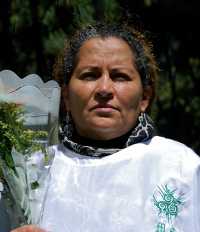Interview
Luz Marina Bernal, 'Mother of Soacha' and winner of the 2012 ICIP Peace in Progress Award

Luz Marina Bernal
Photo: Irati Lafragua
Luz Marina Bernal, along with four other Colombian women of the group known as the 'Mothers of Soacha', has been declared the winner of the second ICIP Peace in Progress Award, for 2012. The award recognises the struggle for justice of these women, the mothers of youths extrajudicially executed by Colombian security forces, in cases known as "false positives".
What are "false positives"?
They relate to the recruitment of indigenous people, peasants, poor youth, who are taken, with false promises of work, far from their homes. Once there, the army buys them as a commodity, they simulate a battle, kill them and, once they're dead, they put uniforms on them to make them look like members of outlawed groups, such as the guerrillas.
Why do the soldiers kill these youths?
In 2005, during the government of Alvaro Uribe, they introduced the payment of rewards to soldiers for the deaths of guerrillas in combat. Large sums of money, in addition to letters of congratulation, medals or leave. It doesn't only happen in Soacha: more than 3,000 extrajudicial killings have been reported across Colombia. They look for the most vulnerable people, as they believe that their families will not be able to face up to the state. Very few of us are willing to keep fighting for their memory.
What happened to your son and why was the group of Mothers of Soacha formed?
My son, Fair Leonardo Porras Bernal, was 26 years old and mentally disabled; he could not read or write, nor did he know the value of money. He disappeared on 8 January 2008 and a few days later he was killed by an army brigade. Since then, I have belonged to the group of Mothers of Soacha, which now includes 21 families. We discovered that they murdered them with the simple objective of making money. They stole their identities and put them in mass graves so that we wouldn't find them. Our goal is to fight against a state that does not want to recognise what happened and admit its responsibility for the murders.
How many cases have been filed and what stage are they at?
For Soacha, 19 cases have been filed. In 2011, eight soldiers were condemned for two youths found in the town of Cimitarra. Six soldiers have been found guilty for the death of my son, although the highest ranking officer has escaped. What concerns us most is that there are still seven cases which are being left with total impunity. The judges do not accept that within the army there is a criminal group, nor do they recognise that these are crimes against humanity. It's very sad, and here nobody, absolutely nobody, speaks out about the issue.
In your son's case and in others it has been shown that the accusations of membership of an illegal group and of death in combat were false. What was the government's response?
In 2010, the then President Uribe met with some mothers and offered them 18 million pesos in compensation. When they offered it to me, I told them that I didn't give birth to my children for the war nor to sell them. I even had a message sent to the President saying that if it was a question of negotiating, and he offered me 18 million pesos for my son, who was from a low social class, I would pay him 40 million for one of his sons. My son is an irreplaceable human being: not even all the money in the world could bring him back. What I demand is truth and justice, and that such events never happen again.
Your fight against impunity is risky. Do you receive threats?
Yes, ever since the first complaint. Maria Sanabria was approached by two men who told her that if she didn't shut up, the same thing that had happened to her son would happen to her. They began threatening me in 2009: they tell me to keep quiet or else something will happen to my other son. They leave us notes at our homes with bullets, saying they are for us. We are frightened, because we have other children, but I'm prepared to give my life for this fight.
Do you have faith in the peace negotiations that are currently going on between the government and the FARC?
The process was created overnight by the President because he wants to achieve peace within his government. As a victim, I long for peace for future generations, but I think this process is not positive because it is built on lies. They have not interviewed a single victim to know what we think. Only the interested parties are negotiating.
What role should civil society play?
The organisations, the victims and the lawyers that represent us should play an important role and they have not been taken into account in this process. It would be very sad if this process were to be based on a big lie.
What are the essential conditions for peace in Colombia?
Colombia needs equal rights, the hand over of weapons, and an end to the killings of people in the countryside. An end to hunger, and education, health and decent homes for poor people. And respect for human rights activists. In Colombia there is no respect, we've got the prisons full of human rights activists.